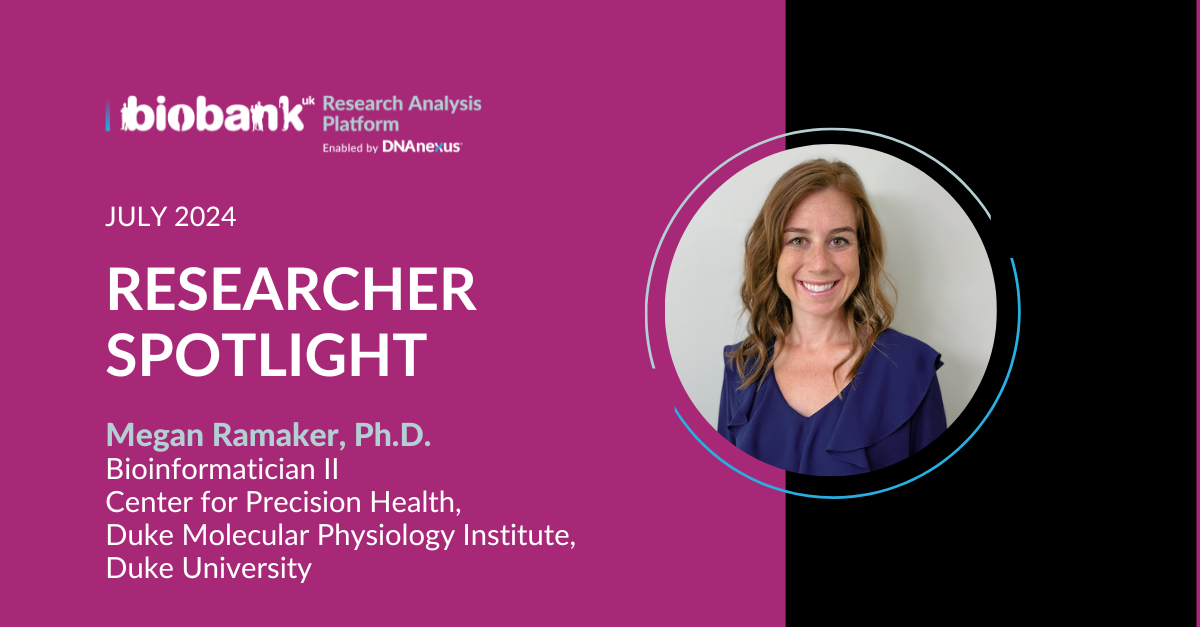The Monthly Researcher Spotlight is our section highlighting the exciting work of the UK Biobank Research Analysis Platform user community. If you would like to be featured, email ukbiobankrap@dnanexus.com.
This was simultaneously published in the July 2024 UK Biobank RAP Newsletter. You can sign up for future installments here.
This month's Spotlight features Megan Ramaker, a bioinformatician performing research to identify biomarkers of cardiovascular diseases.

Megan Ramaker, Ph.D.
Bioinformatician II
Center for Precision Health, Duke Molecular Physiology Institute, Duke University
What are the focus and discovery highlights of your research?
I am a Bioinformatician in the Svati Shah Lab, and our overall interest is in identifying biomarkers of cardiovascular disease broadly. My research is focused on both characterizing the genetic landscape of inherited cardiovascular diseases and using machine learning to develop tools for interpretation of variants of unknown significance. I have recently developed a machine learning algorithm, Cardiovascular Disease Pathogenicity Predictor (CVD-PP), that is a disease- and tissue-specific machine learning model for assessing pathogenicity in variants of unknown significance in 47 genes associated with inherited cardiovascular disease. I have combined this tool with the Catheterization Genetics (CATHGEN) cohort, which consists of whole exome sequencing in patients referred to the catheterization lab at Duke University, to demonstrate the utility of this model for better prioritization of variants that have a high probability of being pathogenic and thus likely to manifest in disease.
What are some of the key questions that you are looking to answer using UK Biobank data?
I am currently using the UK Biobank data to better understand the genetic landscape of inherited cardiovascular diseases in collaboration with a Duke University Pulmonary Critical Care Fellow and NIH R38 Stimulating Access to Research in Residency (StARR) scholar, Dr. Kristin Corey. Through this collaboration we are leveraging Dr. Corey’s clinical expertise and my genetics expertise to both identify individuals with pathogenic variants in inherited cardiovascular disease genes and assess expressivity of disease. We hope that this information will better characterize the genetic landscape of the diseases as well as aid clinicians in providing more personalized treatment.
How has the UK Biobank Research Analysis Platform (UKB-RAP) helped you perform your research?
The UKB-RAP has allowed our lab to analyze the large, multi-modal dataset in a feasible manner. We are able to perform high-throughput, compute-intensive analyses, including genome-wide variant filtering at-scale. The UKB-RAP also supports reproducibility by storing compute job details, including commands, and versioning datasets and scripts created. Lastly, we are able to share code and collaborate in our lab more effectively.
Any tools or tutorials that you have developed that would be useful for the UKB-RAP community?
I have not created any tutorials yet, but I recently created a bed file that includes the start and stop position of every WGS vcf file in the most current version of the WGS data on the UKB-RAP for easier filtering of variants of interest in the WGS data.

.png)
.png)
.png)